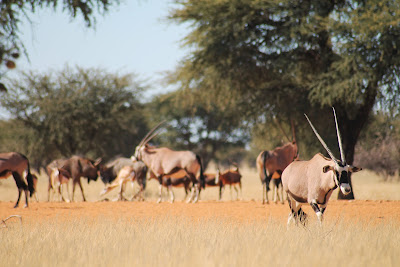Experts in ecology, rangeland management and education science, we offer various programmes in wildlife ecology, conservation and community work in the Kalahari Desert Namibia - one of the last wilderness regions in the world.
Volunteer in field ecology
Arid rangelands worldwide are adversely affected by high levels of human intervention and high climatic variability. In Southern Africa unsustainable and intensified lifestock management together with climatic variability during the last decades often led to desertification with subsequent losses in ecosystem function and services.We are investigating representative components of functional change in vegetation and the alteration in faunal community composition as a result of grazing, fire and rain. In order to understand underlying mechanisms of observed differences, we use herbivore exclusion sites, manipulating plots with fire, rain and grazing and use insect species to study faunal species compostional changes.
Volunteer in community work
At our local research stations we endeavor to also contribute to the local community and children. Do you enjoy being around children, would like to learn about a new culture and feel the urge help in community work?Be a volunteer with us and help us establish local kindergardens, learning and activity centres for local children between the ages from 1 – 7 years old. at our research stations in the Kalahari, within the African wilderness, among a rich wildlife setting.






